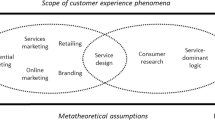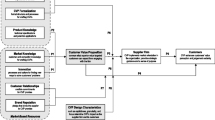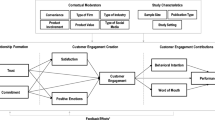Abstract
Previous research of service failures has focused on negative reactions such as retaliation, complaining, and switching behavior. This study is of customer forgiveness that reflects goodwill. Study 1, exploring manifestations of forgiveness in the service context, consisted of interviews with 52 customers. The results suggest that forgiveness is reflected in positive reframing, perspective taking, and tolerance. In Study 2, designed to explore the antecedents of forgiveness, respondents (N = 286, 55.4 % women) were presented with scenarios manipulating strength of relationship and blame, and measuring forgiveness. The results show that the effect of blame on the expected outcomes of forgiveness and loyalty intentions is stronger under strong customer-service provider relationships. Additionally, relationship strength has a stronger effect on forgiveness among women, even under high levels of blame. The results thus offer profiles for forgiving and unforgiving customers.




Similar content being viewed by others
References
Ahluwalia R (2000) Examination of psychological processes underlying resistance to persuasion. J Consum Res 27(2):217–232
Ahluwalia R, Burnkrant RE, Unnava HR (2000) Consumer response to negative publicity: the moderating role of commitment. J Mark Res 37(2):203–214
Aquino K, Tripp TM, Bies RJ (2001) How employees respond to personal offense: the effects of blame attribution, victim status, and offender status on revenge in the workplace. J Appl Psychol 86:52–59
Baumeister RF, Sommer KL (1997) What do men want? Gender differences and two spheres of belongingness: comment on cross and Madson (1997). Psychol Bull 122(1):38–44
Berry LL (1995) Relationship marketing of services: growing interest, emerging perspectives. J Acad Mark Sci 23(4):236–245
Bies RJ, Tripp TM (2005) The study of revenge in the workplace: conceptual, ideological, and empirical issues. In: Fox S, Spector PE (eds) Counterproductive work behavior: investigations of actors and targets. American Psychological Association, Washington, DC, pp 65–81
Bhagat PS, Williams JD (2008) Understanding gender differences in professional service relationships. J Consum Res 25(1):16–22
Bright DS, Exline JJ (2011a) Forgiveness at four levels: intrapersonal, relational, organizational, and collective-group. In: Cameron KS, Spreitzer GM (eds) The Oxford handbook of positive organizational scholarship. Oxford University Press, New York
Boulding W, Kalra A, Staelin R, Zeithaml VA (1993) A dynamic process model of service quality: from expectations to behavioral intentions. J Mark Res 30(1):7–27
Boyd HC III, Helms JE (2005) Consumer entitlement theory and measurement. Psychol Mark 22(3):271–286
Bright DS, Exline JJ (2011b) Forgiveness at four levels: intrapersonal, relational, organizational, and collective group. In: Cameron K, Spreitzer G (eds) Handbook of positive organizational scholarship: 244–259. Oxford University Press, New York
Brown RP (2003) Measuring individual differences in the tendency to forgive: construct validity and links with depression. Personal Soc Psychol Bull 29(6):759–771
Cooper DR, Emery CW (1995) Business research methods, 5th edn. McGraw-Hill, New York
DeWitt T, Brady MK (2003) Rethinking service recovery strategies: the effect of rapport on consumer responses to service failure. J Serv Res 6(2):193–207
Dutton JE, Glynn M (2007) Positive organizational scholarship. In: Cooper C, Barling J (eds) Handbook of organizational behavior. Sage, Thousand Oaks
Exline JJ, Zell AL (2009) Empathy, self-affirmation, and forgiveness: the moderating roles of gender and entitlement. J Soc Clin Psychol 28(9):1071–1099. doi:10.1521/jscp.2009.28.9.1071
Exline JJ, Baumeister RF, Bushman BJ, Campbell WK, Finkel EJ (2004) Too proud to let go: narcissistic entitlement as a barrier to forgiveness. J Pers Soc Psychol 87(6):894–912
Fehr R, Gelfand MJ (2012) The forgiving organization: a multilevel model of forgiveness at work. Acad Manag Rev 37(4):664–688. doi:10.5465/amr.2010.0497
Fehr R, Gelfand MJ, Nag M (2010) The road to forgiveness: a meta-analytic synthesis of its situational and dispositional correlates. Psychol Bull 136(5):894–914. doi:10.1037/a0019993
Finkel EJ, Rusbult CE, Kumashiro M, Hannon PA (2002) Dealing with betrayal in close relationships: does commitment promote forgiveness? J Pers Soc Psychol 82(6):956–974
Geyskens I, Steenkamp J-BEM (2000) Economic and social satisfaction: measurement and relevance to marketing channel relationships. J Retail 76(1):11–32. doi:10.1016/S0022-4359(99)00021-4
Goodman PS, Fichman M, Lerch FJ, Snyder PR (1995) Customer-firm relationships, involvement, and customer satisfaction? Acad Manag J 38(5):1310–1324
Grégoire Y, Fisher RJ (2006) The effects of relationship quality on customer retaliation. Mark Lett 17:31–46
Grégoire Y, Tripp TM, Legoux R (2009) When customer love turns into lasting hate: the effects of relationship strength and time on customer revenge and avoidance. J Mark 73(6):18–32
Gremler DD, Gwinner KP (2000) Customer-employee rapport in service relationships. J Serv Res 3:82–104
Gutek B (1995) The dynamics of service: reflections on the changing nature of customer/provider interactions. Jossey-Bass, San Francisco
Gutek BA, Bhappu AD, Liao-Troth MA, Cherry B (1999) Distinguishing between service relationships and encounters. J Appl Psychol 84(2):218–233
Glaser BG, Strauss A (1967) The discovery of grounded theory: strategies for qualitative research. Aldine-Athestor, Chicago
Hennig-Thurau T, Groth M, Paul M, Gremler DD (2006) Are all smiles created equal? How emotional contagion and emotional labor affect service relationships. J Mark 70(3):58–73
Hess RL, Ganesan S, Klein NM (2003a) Service failure and recovery: the impact of relationship factors on customer satisfaction. J Acad Mark Sci 31(Spring):127–145
Hess RL Jr, Ganesan S, Klein NM (2003b) Service failure and recovery: the impact of relationship factors on customer satisfaction. J Acad Mark Sci 31(2):127–145
Joireman J, Grégoire Y, Devezer B, Tripp TM (2013) When do customers offer firms a “second chance” following a double deviation? The impact of inferred firm motives on customer revenge and reconciliation. J Retail 89(3):315–337
Karremans JC, Van Lange PAM (2004) Back to caring after being hurt: the role of forgiveness. Eur J Soc Psychol 34(2):207–227
Keaveney SM (1995) Customer switching behavior in service industries: an exploratory study. J Mark 59(2):71–82
Kelley SW, Davis MA (1994) Antecedents to customer expectations for service recovery. J Acad Mark Sci 22(1):52–61
Mattila AS (2001) The impact of relationship type on customer loyalty in a context of service failures. J Serv Res 4(2):91–101
McCullough ME (2000) Forgiveness as human strength: theory, measurement, and links to well-being. J Soc Clin Psychol 19:43–55
McCullough ME, Worthington EL Jr, Rachal KC (1997) Interpersonal forgiving in close relationships. J Pers Soc Psychol 73(2):321–336
McCullough ME, Rachal KC, Sandage SJ, Worthington EL Jr, Brown SW, Hight TL (1998) Interpersonal forgiving in close relationships: II. Theoretical elaboration and measurement. J Pers Soc Psychol 75(6):1586–1603
McQuilken L, Robertson N (2011) The influence of guarantees, active requests to voice and failure severity on customer complaint behavior. Int J Hosp Manag 30:953–962
Melnyk V, van Osselaer SMJ (2012) Make me special: gender differences in consumers’ responses to loyalty programs. Mark Lett 23(3):545–559
Melnyk V, van Osselaer SMJ, Bijmolt THA (2009) Are women more loyal customers than men? Gender differences in loyalty to firms and individual service providers. J Mark 73(4):82–96
Miles MB, Huberman AM (1994) Qualitative data analysis: an expanded sourcebook, 2nd edn, vol xiv. Sage Publications, Inc., Thousand Oaks
Miller AJ, Worthington EL Jr, McDaniel MA (2008) Gender and forgiveness: a meta-analytic review and research agenda. J Soc Clin Psychol 27(8):843–876
Mittal V, Huppertz JW, Khare A (2008) Customer complaining: the role of tie strength and information control. J Retail 84(2):195–204
Noble SM, Griffith DA, Adjei MT (2006) Drivers of local merchant loyalty: understanding the influence of gender and shopping motives. J Retail 82(3):177–188
Patton MQ (2002) Qualitative research and evaluation methods, 3rd edn. Sage, Thousand Oaks
Riek BM, Mania EW (2012) The antecedents and consequences of interpersonal forgiveness: a meta-analytic review. Pers Relatsh 19(2):304–325
Rusbult CE, Farrell D, Rogers G, Mainous AG (1988) Impact of exchange variables on exit, voice, loyalty, and neglect: an integrative model of responses to declining job satisfaction. Acad Manag J 31(3):599–627
Rusbult CE, Zembrodt IM, Gunn LK (1982) Exit, voice, loyalty, and neglect: responses to dissatisfaction in romantic involvements. J Pers Soc Psychol 43(6):1230–1242
Russell D (1982) The causal dimension scale: a measure of how individuals perceive causes. J Pers Soc Psychol 42(6):1137–1145
Takaku S (2001a) The effects of apology and perspective taking on interpersonal forgiveness: a dissonance-attribution model of interpersonal forgiveness. J Soc Psychol 141:494–508
Takaku S (2006) Reducing road rage: an application of the dissonance-attribution model of interpersonal forgiveness. J Appl Soc Psychol 36:2362–2378
Tax SS, Brown SW, Murali C (1998) Customer evaluations of service complaint experiences: implications for relationship marketing. J Mark 62(April):60–76
Takaku S (2001b) The effects of apology and perspective taking on interpersonal forgiveness: a dissonance–attribution model of interpersonal forgiveness. J Soc Psychol 141(4):494–508
Tsarenko Y, Gabbott M (2006) Forgiveness: a new insight into business relationships. In: 2006 AMA educators’ proceedings: enhancing knowledge development in marketing, vol 17, pp 30–36
Tsarenko Y, Rooslani Tojib D (2011) A transactional model of forgiveness in the service failure context: a customer-driven approach. J Serv Mark 25(5):381–392
Tsarenko Y, Strizhakova Y (2009) Service failures and customer forgiveness in the healthcare sector. Mark Theory Appl 20:196–203
Worthington EL Jr (ed) (2005) Handbook of forgiveness. Brunner-Routledge, New York
Wieseke J, Geigenmüller A, Kraus F (2012) On the role of empathy in customer-employee interactions. J Serv Res 15(3):316–331
Xie Y, Peng S (2009) How to repair customer trust after negative publicity: the roles of competence, integrity, benevolence, and forgiveness. Psychol Mark 26(7):572–589
Zechmeister JS, Garcia S, Romero C, Vas SN (2004) Don’t apologize unless you mean it: a laboratory investigation of forgiveness and retaliation. J Soc Clin Psychol 23(4):532–564
Zourrig H, Chebat JC, Toffoli R (2009) Exploring cultural differences in customer forgiveness behavior. J Serv Manag 20(4):404–419
Author information
Authors and Affiliations
Corresponding author
Rights and permissions
About this article
Cite this article
Yagil, D., Luria, G. Customer forgiveness of unsatisfactory service: manifestations and antecedents. Serv Bus 10, 557–579 (2016). https://doi.org/10.1007/s11628-015-0282-1
Received:
Accepted:
Published:
Issue Date:
DOI: https://doi.org/10.1007/s11628-015-0282-1




